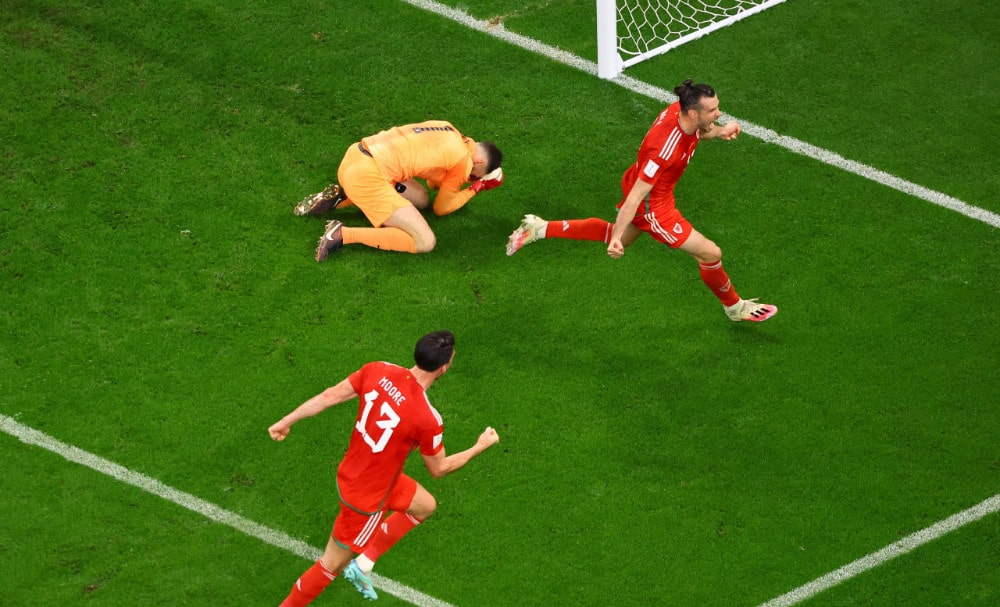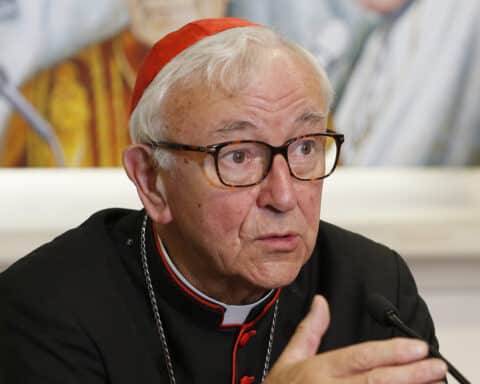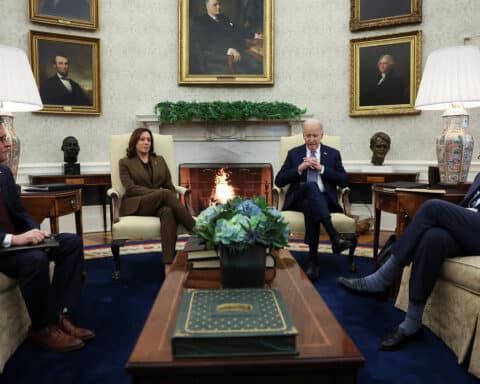One might think — or at least hope — that the ongoing World Cup would be a brief respite from the daily bombardment of the hyper-gender-trans-sexualization of public life. One would be naive in such a hope. Even before the competition started, the United States team changed its crest by substituting the seven red stripes beneath a stylized “USA” with rainbow colors. And seven European sides (including England and Wales) similarly put an end to such naivety on the first day of competition, when they indicated their intention to wear “OneLove” rainbow armbands. FIFA, the governing body of world football, quashed the latter intention by threatening to penalize any players and teams wearing the armbands.
The most ardent proponents of such symbolism are the most disingenuous. They will tell us that the symbols mean nothing more than a commitment to inclusion and tolerance. Everyone is welcome to such public events as football matches, the subterfuge goes, and none should feel alienated or excluded. If that were the case, of course, it would be difficult to object. But this is so much window dressing for an agenda that is much more aggressive, radical and, to a very large percentage (if not a majority) of people, morally objectionable. The activists who originate and enforce these kinds of public expressions do not merely intend to foster an atmosphere in which persons with gender dysphoria and same-sex attractions are accepted, respected and loved; rather, their purpose is to force everyone to endorse a set of particular moral and political positions, among which are legitimizing same-sex marriage, separating gender from sex and normalizing mutilating genital surgery in the name of “gender affirmation.” And, of course, the symbols represent an agenda to ostracize those who object.
Even if many players really do intend to reflect nothing more than tolerance and inclusion, the (purposeful) ambiguity of the symbols defeats any such intention. And it is precisely this ambiguity that suggests all such symbols should be separated from sport. Athletes should be free to use the public platforms that their celebrity creates to advocate for any moral position they wish. To the extent that corporate sponsors support these moral platforms, the athletes’ fame and fortune might even increase. While I may or may not agree with any particular moral agenda, I would never gainsay an athlete’s liberty to endorse it.
But this is quite different from forcing other players to validate the agenda or, even worse, implying that an entire nation ratifies it. If a majority of players (or a national federation) decides to wear any symbol of a partisan or moral agenda, it is not possible to separate identification of that agenda from the nation that the player or federation represents. This is not only unfair but fundamentally immoral. It forces even nonparticipants to impliedly sanction a moral or political position to which many have reasonable objections. This is especially the case with rainbow symbols, which are meant to endorse moral, political and legal positions to which even some same-sex activists and radical feminists object.
The Catechism of the Catholic Church emphatically teaches that people with same-sex attraction “must be accepted with respect, compassion, and sensitivity.” As such, “every sign of unjust discrimination in their regard” is prohibited. And the admonition is easily extended to persons with gender dysphoria or other gender-identity issues. We sin by our disobedience to such moral demands. But this is quite different from morally endorsing same-sex sexual activity, same-sex marriage, or so-called gender affirmation surgery, or supporting legal and political structures that institutionalize such things.
National flags and national anthems are distinct from these particular and divisive symbols. And, in fact, the meaning of such symbols is more reason to ban the moral badges. The flag and national anthems do unambiguously symbolize national identification and pride. By volunteering to play for national teams, one implicitly expresses agreement with the national identity. To the extent that an athlete has reservations, he can choose not to play or express those reservations off the pitch, court or field, as noted above.
But divisive moral and political symbols are another matter. Even if the symbols are ambiguous and can be taken in different ways by different people, they should still have no place on national team kits or national team symbols. If they are ambiguous, they defeat the purpose of their proponents. If they are not, they force people to endorse moral and political positions to which they object. The only reasonable solution is to ban any such symbols from team sport. Rather than to unify, they divide. More importantly, they turn sport from a diversion from contentious moral and political squabbles to their platform. This detracts from the enjoyment of sport qua sport for everyone. To borrow a ubiquitous American metaphor, we need a high, impregnable wall of separation between politics and sport.
Kenneth Craycraft is the James J. Gardner Family Chair in Moral Theology at Mount St. Mary’s Seminary and School of Theology in Cincinnati.





